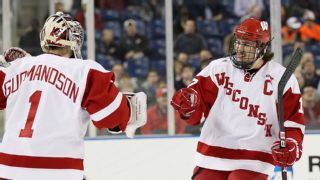|
NEW YORK -- Watch Ryan McDonagh during the singing of the national anthem and pay close attention when it ends. While other players disperse, shaking out their skates, strapping on their helmets and taking one last mini-lap before the puck drops, McDonagh remains at the blue line, still. It's not until the American flag, and often the U.S. serviceman or woman carrying it, exits the ice that he skates off for the last few seconds of pregame preparation. It's just a thing he does, he says, to show appreciation for his country and those who serve. It's a simple token of respect. At a time in the game when the very notion of respect is a hot topic of debate, McDonagh represents a throwback of sorts. Still young at just 24, he embodies the old-school, blue-collar, meat-and-potatoes hockey player of previous generations, a player who embraces the concept of loyalty, commitment, honor and, most importantly, respect. Respect is not just something McDonagh has shown, it's something he has earned -- from coaches, management and teammates alike -- in his time with the New York Rangers, during which he has quickly developed from a top prospect to one of the team's brightest stars. "He's been by far our best defenseman," coach Alain Vigneault said in a recent pregame briefing. "Probably one of our best overall players." In a season that has already been muddled with some tough stretches, including an abysmal nine-game road trip to start the season and the team's recent four-game slide, McDonagh's steadying presence on the back end has become even more critical for a Rangers club fighting to remain in the top eight spots in the Eastern Conference. The head coach indicted his team's compete level and called out the team's veteran leadership this week, but McDonagh was one of the few players actually praised for his play. Through 33 games this season, McDonagh is fourth in team scoring and top among Rangers defensemen with six goals and 19 points. He leads all Rangers in ice time with 23:52 per game, averaging almost two minutes more than his ironman defensive partner, Dan Girardi. Those minutes might actually increase now with Marc Staal out with a concussion. His value to the team, now without both Staal and sparkplug captain Ryan Callahan (knee) due to injury, has never been more important. And his leadership role is certain to expand. It has been steadily growing anyway since he inked a six-year, $28.2 million contract extension with the Rangers in July. The team's decision to lock him up long-term, rather than the standard "bridge deal" given to most players coming off their entry-level contracts, was a good indication of their plans for the young blueliner. McDonagh has tried to live up to such expectations accordingly.  "I feel like I'm taking a lot more of a role in that [leadership] department, speaking up a little bit more in team meetings, in between periods, stuff like that," McDonagh told ESPN.com. "More importantly, for me, I think, is just to continue to stand up in my role on the ice." It is a commonly accepted truth that an NHL defenseman is the position that takes the most time to develop. And though McDonagh's ascent has been rapid, his career arc has been somewhat unorthodox. A standout at Minnesota's famed Cretin-Derham Hall High School, the St. Paul, Minn., native actually played forward in both his freshman and sophomore seasons, simply because he had so much offensive potential and the team needed some scoring up front. Eventually, his phenomenal skating was just too hard to ignore. McDonagh was moved to his natural position in his junior year, when he helped the team to the school's first hockey state championship in 2006. He went on to be named Minnesota's Mr. Hockey in 2007. "I've never seen someone skate laterally so well at that age," Cretin Durham-Hall coach Jim O'Neill told ESPN.com. That's saying something, especially considering O'Neill is now in his 34th year coaching. He coached McDonagh in baseball, too. The star athlete, a first baseman, outfielder and exceptional left-handed hitter (he also played safety on the football team for a spell) was always finding ways to impress his coach. Most of the times it was on the ice or on the field. But sometimes it was not. Like the time McDonagh came to speak to a group of freshman kids as a mentor in a life lessons class, dishing out a preternaturally mature message. "He said the only thing that was going to stop him from the NHL was not being good enough," O'Neill said. McDonagh, whose even-keel countenance has often led people to believe he's much older than he is, was always mature. "He's just a wholesome, solid kid and such an outstanding guy from every angle," said McDonagh's agent, Ben Hankinson. Those around him credit his parents, Sean and Patty, and a strong family structure that also includes his uncle, former NFL quarterback, Steve Walsh. The first time agent Chris McAlpine met him was while coaching him for a local fall league of the area's elite players. As a former NHL defenseman himself, McAlpine obviously recognized his skating ("he skates faster backward than most guys do forward") but was immediately struck by his commanding presence. "He just seemed that much more mature than any other kid I'd met at that age," McApline said. "He does just have that presence, on the ice in the way he competes and plays, and off. He's a good teammate and he just exudes that, 'I'm a leader.'" McDonagh went on to the University of Wisconsin, and this is where his development took an interesting progression. Heralded as a high school player for his offensive acumen, he was encouraged to embrace the defensive side of his game in college during his three seasons as a Badger. No one was more instrumental to that end than former assistant coach Mark Osiecki, now assistant coach of the AHL's Rockford IceHogs. Osiecki helped guide a young player with a special talent set -- "unbelievable athleticism" and an "incredible ability to pivot backward to forward" -- and further equip him with the tools to succeed. They worked on his positional play, his stick presence and his overall game. Osiecki never had to worry about the intangibles, though, because those McDonagh always had in abundance. "He's so even," Osiecki told ESPN.com when reached by phone this week. "Hockey is a game of mistakes, but his ability to handle the ups and downs -- not losing the intensity -- but his pulse is even almost all the way through." McDonagh insists that he's not entirely unflappable. He gets jitters before the game. He gets agitated when stuck in traffic. Even in the moments before his wedding this past summer to his high school sweetheart, Kaylee (also a college hockey player), he admits he was a little nervous.  "I didn't think I would be, but I was," he said. And those close to him will tell you that when he was traded from Montreal to New York back in 2009 -- a deal that will likely go down as one of Glen Sather's finest moments as general manager of the Rangers -- he was shocked and stunned. To a large degree, so was Rangers director of player personnel Gordie Clark when he heard that the Canadiens were willing to include the former first-round pick (12th overall pick in 2007) in a deal that brought him to Broadway in a multi-player trade that sent Scott Gomez and his hefty contract back the other way. Clark had followed McDonagh in various international tournaments, in the Under-18s and World Juniors, and knew how good of a prospect the Rangers were picking up. His game has made a dramatic transformation even since then. From the type of young player that was always leading the rush and hammering the puck -- "he was so much bloody faster and stronger than everyone else," Clark said -- he has taken on a decidedly more defensive role as part of the team's top shutdown pair. Though McDonagh and Girardi are often tasked with containing an opposing team's top lines, he has still managed to mix in some offense as well for a Rangers club struggling in scoring. "He's really developed well into picking his spots now," Clark said, "and that's because we need him really damn bad on defense." For as impressed as Clark was with McDonagh as a prospect and potential draftee, the appreciation has only grown. Looking back at the Eastern Conference quarterfinals against the Washington Capitals last spring, Clark is still shaking his head about one particular Alex Ovechkin hit that he was sure was going to leave McDonagh either concussed or badly injured. Instead, McDonagh came to the bench, chest heaving, and was ready to go back out there for his next shift. "He just got up and kept playing. The more you give him, the more he takes," Clark said. "And the coaches keep saying, 'We can give him more.'" It goes without saying that McDonagh is not just a coach's favorite but a beloved teammate as well. A frequent recipient of the Broadway Hat, the team's makeshift MVP trophy, McDonagh's play might fly under the radar at times, but never among the guys sitting next to him in the dressing room. "He's been the same player from Day 1," said longtime friend and teammate Derek Stepan, who also played with McDonagh at Wisconsin. "Now he's finally getting the recognition he deserves." His leadership and sacrifice commands as much respect as his talent. Just like his signature pinch (a trademark move that his own teammates have learned to anticipate each time a stretch pass is made on an opponent's breakout) and his quirky superstitions (he once pointed out to a teammate a broken skate lace, methodically, before each period of a particularly successful game), McDonagh's heart-and-soul effort has come to be a given each night. This is a player whose eyes welled up with tears after a loss in Game 2 against the Capitals in the playoffs last spring, not because of the defeat itself but because he felt he had let his teammates down. McDonagh had committed a rare, uncharacteristic delay-of-game penalty in overtime that led to Mike Green's game-winning power-play goal. "Mac as a person is exactly how you'd expect him to be as a person," said Stepan, who will have McDonagh as his best man in his wedding this August. "He carries himself in a very professional way. He's a good teammate, he's a good guy to be around." With the accolades he has rightfully wrangled over the past few years, and his play so far this season, McDonagh is considered a lock to make the U.S. team that will compete in the 2014 Olympics in Sochi, Russia. A player of supreme loyalty, McDonagh's biggest concern right now is not an Olympic spot. Not with the Rangers in such dire straits and such responsibility on his shoulders to dig them out. But it is on the back of his mind. Remember, this is the player who waits patiently each game before the flag leaves the ice before he moves a skate. Of course, he would be proud to represent his country. "It would be an honor being on the team," McDonagh said. "For sure."
|

